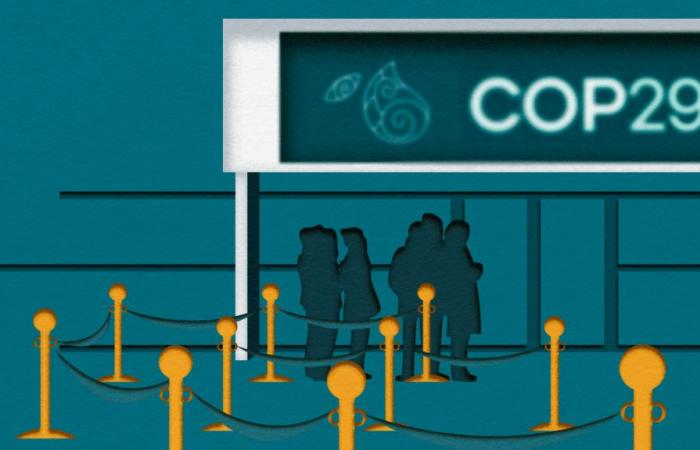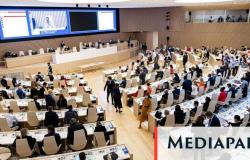Last year in Dubai, the previous Conference of the Parties brought together more than 80,000 participants. But the 2024 edition of the UN climate change summit promises to be much less crowded, with notable absences.
Fewer delegates, fewer heads of state, fewer business leaders, fewer observers… The 29th UN Conference on Climate Change, COP29, opens Monday, November 11 in Baku, in Azerbaijan. And this year, the organizers are unashamedly displaying a reduction in the badges and accreditations distributed each year to the delegations of the 194 countries invited to look into the future of the planet. As of October 21, 32,000 people had been accredited to access the “blue zone”, a space administered by the United Nations and in which negotiations take place.
For comparison, last year at the same time, the Emirati authorities announced 80,000 participants for COP28 in Dubai, the largest edition ever organized. Should we conclude from this that this new meeting does not excite the crowds? Far from it. “The size [d’une COP] does not necessarily translate into the quality of the results”, declared the UN climate secretary, Simon Stiell, in April during a meeting in London. The United Nations and the host country, co-organizers, are expecting between 40,000 and 50,000 people, gathered for two weeks in the Olympic stadium in the Azerbaijani capital.
According to a list posted online at the end of October, 109 heads of state and government requested to speak at the podium, compared to more than 130 in 2023. This list does not include, among others, nor Emmanuel Macron, neither the American President, Joe Biden, nor the German Chancellor, Olaf Scholz, all three absent from the Azerbaijani meeting. This number of managers, in decline, remains however “still much higher than just a few years ago”, notes the deputy director of 350.org, Andreas Sieber, cited by the specialist site Climate Home. Until COP21, in 2015 in Paris, attracting more than a hundred leaders “was considered unthinkable”.
In reality, until COP15 in Copenhagen (Denmark) in 2009, UN summits on climate change did not really interest the general public. Even during COP3, in Japan in 1997, which established the Kyoto Protocol (a sort of ancestor of the Paris agreement), the number of participants barely approached 10,000 participants, press included. But little by little, the release in 2006 of Al Gore's film (An inconvenient truth), the Nobel Peace Prize awarded to the IPCC the following year, and, of course, the mobilization of the scientific community and NGOs, have opened up the mysteries of climate diplomacy to the uninitiated.
In their work Governing the climateresearchers Amy Dahan and Stefan Aykut note that in 2009, in the run-up to COP15, NGOs, politicians and the media presented the summit with one voice from the perspective of a “an exercise in planetary voluntarism (…), a decisive global moment where everything will be at stake for the climate and everything can be resolved.” At the opening of the negotiations, 56 newspapers from 45 countries (including The World in France) published a joint forum to call leaders to action.
But the disappointing results of the Danish gathering caused media interest to drop and, in the following years, in Cancun (in Mexico) then Durban (in South Africa), the negotiations again took place away from the world's cameras. entire. Same thing for COP18 which was held in a controversial country, Qatar. Thus, when the United Arab Emirates secured the organization of COP28 in Dubai, ten years later, the general public deplored what many wrongly thought was the first UN climate summit organized by a Gulf petromonarchy.
If all COPs make it possible to make progress or put decisive issues on the table, some are considered to be “techniques”, when others (like the COP21 organized in Paris in 2015, or the COP26 in Glasgow, Scotland) are noted on the agenda as essential milestones. Logically, they attract more people, even if the prize in numbers goes to Dubai (COP28) with these more than 80,000 participants, who came to do, see or observe the first assessment of the Paris agreement.
For actors excluded from the heart of the negotiations (such as the media, business leaders, scientists, academics or activists), this COP29 in Azerbaijan, “technique” and focused on finance, arouses less interest than the next one which will be organized in Belem (Brazil) and will mark the 10 years of the Paris agreement. Quoted by the Financial Timesleaders from the world of finance assured at the beginning of October that they would be present in Belem, but not in Baku. They also mentioned “fewer opportunities to network with customers” and one “difficult logistics”.
The decisions of States not to send delegations to COP29 are even more alarming for the very health of this multilateral process. On October 31, Papua New Guinea's Minister of Foreign Affairs, Justin Tkatchenko, confirmed that his country would boycott the negotiations, described as “waste of time”. “There's no point in going there if it's to fall asleep, because of the time difference. Because we won't do anything”attacked the Papuan minister, in a new effort to warn about the inaction of major emitters of greenhouse gases, in particular oil-producing states such as Azerbaijan.
Azerbaijan, a Caucasian country rich in hydrocarbons and an ally of Vladimir Putin's Russia, is a controversial host for this COP29, to say the least. While Baku represses all forms of protest, the European Parliament adopted a non-binding resolution at the end of October denouncing “the repression which has significantly intensified in the run-up to COP29”. “Azerbaijan’s current human rights violations are incompatible with its status as host country”he also judges. The Quai d'Orsay even advises against going there, so as not to expose yourself “at risk of arrest, arbitrary detention and unfair trial”.
Under these conditions, the arrival of NGO activists or academics, actors who participate in the COPs on the sidelines of the negotiations, risks being less important than in recent years. Some have also denounced the difficulty in obtaining passes for the event, while three French and British journalists, cited in June by The Guardianalready deplored having been refused access to a conference on energy organized in the Azerbaijani capital and testified to intimidation on the spot.
“As COP29 approaches, the civil society environment in Azerbaijan has become increasingly constrained and dangerous,” confirms journalist Arzu Geybulla and researcher Ruth Townend in a report from think tank Chatham House (a PDF). Or “Without the space and impetus for contributions from academics and civil society, Azerbaijan risks failing in its climate leadership efforts, with consequences both domestically and internationally”they observe. It remains to be seen whether the absence of these voices will be reflected in the ambitions that will emerge from this COP29. A technical COP, but crucial.






